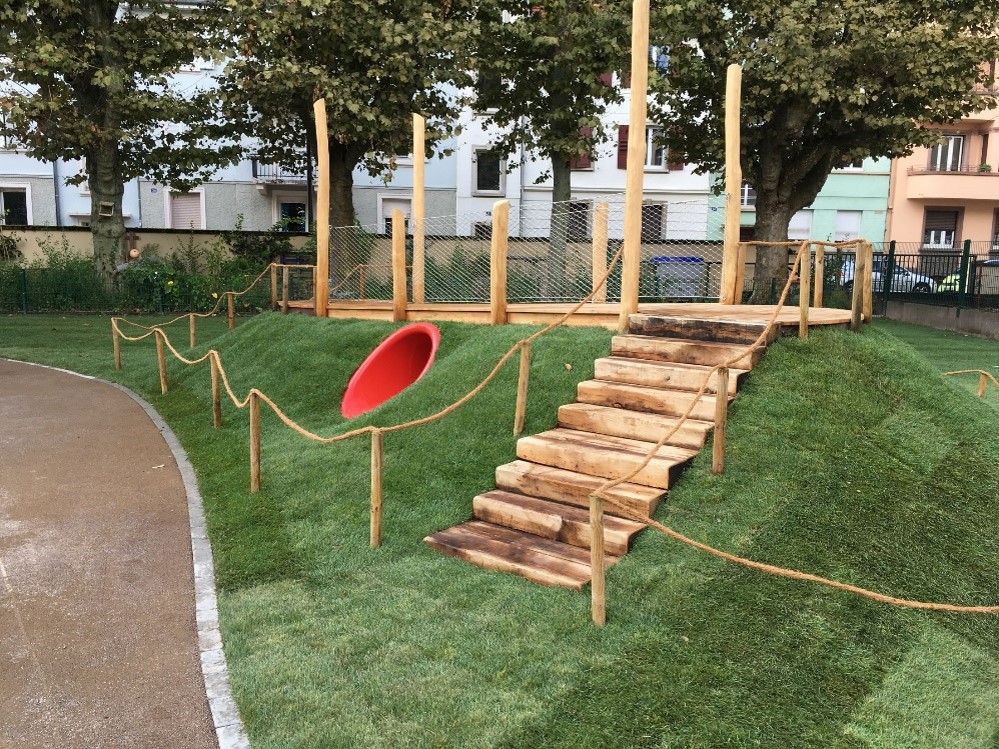Redesigning school and childcare playgrounds to combat climate change, to reinvent usage and to promote gender equality
In the context of a climate emergency, the City of Strasbourg has embarked on a massive plan to demineralise and reinforce the role of natural areas in the city, in particular through the Canopy Plan and an ambitious plan to redevelop its schoolyards and childcare facilities.


Overview of the project
To ensure Strasbourg’s resilience to climate change, in the context of a state of climate emergency, the City of Strasbourg has embarked on a massive plan to demineralise and strengthen the place of nature in the city through the ambitions of the City of Strasbourg’s Canopy Plan.
Schoolyards represent large, mineralized and waterproofed surfaces, often for functional reasons and ease of maintenance. Demineralising and greening them can, on the one hand, contribute substantially to the fight against global warming and, on the other hand, enable their educational function to be rethought. Thus, in November 2020, an ambitious demineralisation/vegetation plan for Strasbourg’s schoolyards and childcare facilities was approved.
Revegetating schoolyards meets multiple objectives in order to provide the best possible educational conditions for children and to open up these spaces to the neighbourhood: to create pockets of cooler temperatures, to reinvent the schoolyard by rethinking its uses and the mix of spaces and by conceiving the schoolyard as a pedagogical tool for learning and developing skills, to raise awareness and educate the educational community about climatic and environmental issues, but also about biodiversity and the city as a place for food, to encourage more equal relations between girls and boys, to strengthen the social link between children, between parents and on a neighbourhood scale, by developing a protocol that will make it possible to create a collective of committed citizens and to create new spaces of freshness and conviviality in the vicinity.
Demineralising and greening courtyards to adapt to climate change and rethinking their educational value.
implementation
Framework decision of 16 November 2020 / project still in progress
Experimental demineralisation interventions were initiated in the first 3 schools from autumn 2020.
In 2021, 2 childcare facilities and 7 schoolyards were reconfigured for the start of the school year in September. For the 2022 programme, the consultation process began at the beginning of January in order to carry out work in the autumn in 8 schoolyards or Early Childhood Education Centres (ECECs). From 2023 onwards, the aim will be to intensify our interventions with the objective of treating 15 to 18 yards per year, while maintaining a very high level of consultation and quality of development.
Strong interest from the various stakeholders in the consultation: pupils, educational staff, school management, technical staff, etc.
The design of the space raises questions about its various functions: games, education, leisure, sports activities, early-learning activities, gender equality, distribution of spaces, and also raises many questions about the place of schools (and more generally of public spaces) in the fight against the heat pockets and the adaptation to climate change.
This project is financed via the budget of the city of Strasbourg with the mobilisation of external funding such as that of the Rhine-Meuse water agency within the framework of the territorial water-climate contract.
organisation
The city of Strasbourg, with 285,000 inhabitants, is administered by a municipal council and the mayor, J. Barséghian. It has specific competences and its own budget. For many years, the City of Strasbourg has been taking its part in the global climate challenge by declaring a state of climate emergency in July 2020. With this declaration, the City recognises its vulnerabilities, already perceptible through episodes of extreme heat, severe weather, air pollution, but also the need and the will to act in the face of the consequences of climate disruption with the first steps immediately taken, such as the canopy plan, the demineralisation of schoolyards and public spaces, and many other climate initiatives within its climate plan.
The whole approach is developed within the framework of an in-depth consultation on the co-design of the space by all members of the educational community: children, parents, teaching and municipal staff, associations, elected officials. Active animation methods, workshops, school visits and various tools will be proposed.
Various departments of the local authority are involved, in particular the Department of Children and Education and the Department of Public Space and Nature.
In order to select the courtyards to be planted from 2022, a call for projects was launched in November 2020 via the Strasbourg ça pousse website.
The support and consultation phase is being conducted in partnership with the Eco-Conseil Institute https://ecoconseil.org/institut-eco-conseil

